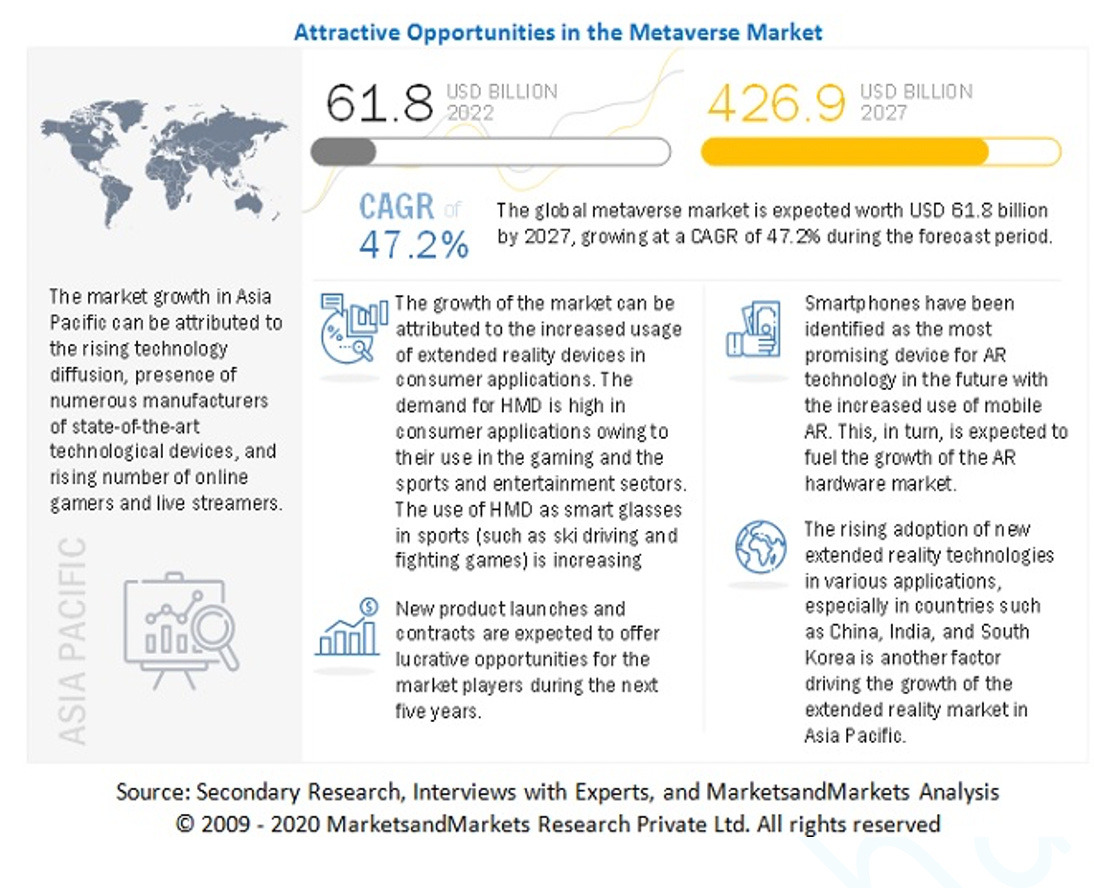According to MarketsandMarkets, the global metaverse market size will reach $426.9 billion by 2027 at 47.2% Compound Annual Growth Rate (CAGR). Notably, earlier this year, the metaverse market was valued around $61.8 billion. The expected exponential rise is mainly due to the increase in demand across media and entertainment as well as the gaming industry. Its growth will be further boosted due to advancing opportunities from those adjacent markets such as Augmented Reality (AR), Virtual Reality (VR), Mixed Reality (MR) as well as digitalisation in art, retail and the fashion industries. Opportunities in the metaverse market have not been lost on big companies such as Facebook (rebranded as Meta in 2021), Microsoft, Google and Apple, all pouring capital into metaverse, so it is no wonder this emerging technology is estimated to be an $80 billion market by 2024. Recently, it was reported that world leading wireless technology innovator, Qualcomm, had launched around $100 million funds targeted at AR and VR technologies to set the metaverse in motion. Also, tech research and consulting firm, Gartner, predicts that about 25% of people will spend at least one hour a day in the metaverse for shopping, social media, entertainment, education, work, and more, by 2026. Yet already the metaverse is predicted to have had a huge impact on business, showing an undeniable potential to transform many sectors. But what exactly does the metaverse mean for future society, and how will it transform the business world?
Source: MarketsandMarkets
Remote work
It is no news that the pandemic catapulted the world into digital transformation and most businesses still continue operating a remote working module, even in the post-pandemic era. Whilst remote work has its advantages, it has also led to reduced creative interactions, communication and collaborative work among colleagues. However, the metaverse could restore the traditional work culture without compromising the remote working module as it enables real-time in-person conversations. The metaverse creates persistent VR workplace environments to encourage employee interaction, corridor chat, collaborative activities, etc.
Immersive shopping experience
As ‘quick commerce’ (Q-commerce), i.e. on demand, and E-commerce increase, there is an apparent need for technologies such as the metaverse which could create innovative and meaningful interactions. As an AR platform, the metaverse will help businesses offer unique experiences to their customer base. The visible growth of virtual characters in retail sectors has pushed brands to improve digital experiences for communication and build customer loyalty.
Enhanced corporate earnings and training
Businesses strive to increase time and cost optimisation without passing through the stress of re-organising workflows that might lead to delays. This is where the metaverse offers some unique advantages, creating a digital environment where testing new products and layouts does not impede on work in the physical world, whereby increasing productivity.
Better marketing and engagement
Today, marketing is about resonating with customers. Rather than printing adverts, the metaverse allows customers to have a more interactive and immersive experience with a company so enabling potential buyers to connect faster with a product or service. It also offers a unique and lucrative space for brands to communicate to their audience, thereby enhancing the shopping experience and help businesses develop an innovative strategy to reach a more niche target audience best suited for them. There are many possible ways the metaverse can change business providing new ways for brands to collaborate and communicate with their customers globally and support a virtual economy where users can leverage many activities to develop new businesses.
Nike
Nike's Roblox store, Nikeland, was one of the first proof of concepts for mainstream metaverse commerce. The sportswear giant built the store on the expertise of RTKFT, its newly acquired metaverse agency, in order to facilitate a gaming experience that is Nike-branded and sells virtual goods to users. In the first two months, the store had about 7 million visitors from all over the world. However, according to Roblox, Nikeland has now had over 21 million and Nike's digital now represents 26% of the total Nike brand revenue.
KPMG
Seeking to create a virtual environment where clients can develop strategies, KPMG recently launched its digital collaboration hub. This metaverse hub offers a private place where training sessions, job interviews and employee evaluations can be conducted. In this digital space, employees, partners and clients can organise virtual team meetings and share ideas. KPMG has also formed a team of technology and innovation experts to help clients around metaverse design, cryptocurrency assets, use cases of NFTs, broader Web3 integrations and community engagement. Although the organisation reportedly accumulated revenue of about $32 billion for its 2021 fiscal year, it still seeks to expand its takings by leveraging the metaverse.
Accenture
Operating its own metaverse called the Nth floor, Accenture onboarded 150,000 new team members virtually during the pandemic. Instead of working via zoom meetings, every new employee was given a laptop and an extended reality (XR) headset. Their first day was spent working in the metaverse at the virtual One Accenture Park. After the first immersive experience, they were then included in team collaboration where they participated during multiple meet-and-greets, and large and small group meetings. The Nth floor is a space where the company’s employees meet and socialise as teams and participate in new hire orientation and immersive learning.
The importance of the metaverse in the business world is undeniable but it does, however, require considerable infrastructural support. Businesses also need to be flexible and adopt a long-term digital transformation strategy that will put them ahead of the curve and unfold a world of new possibilities.






No comments: